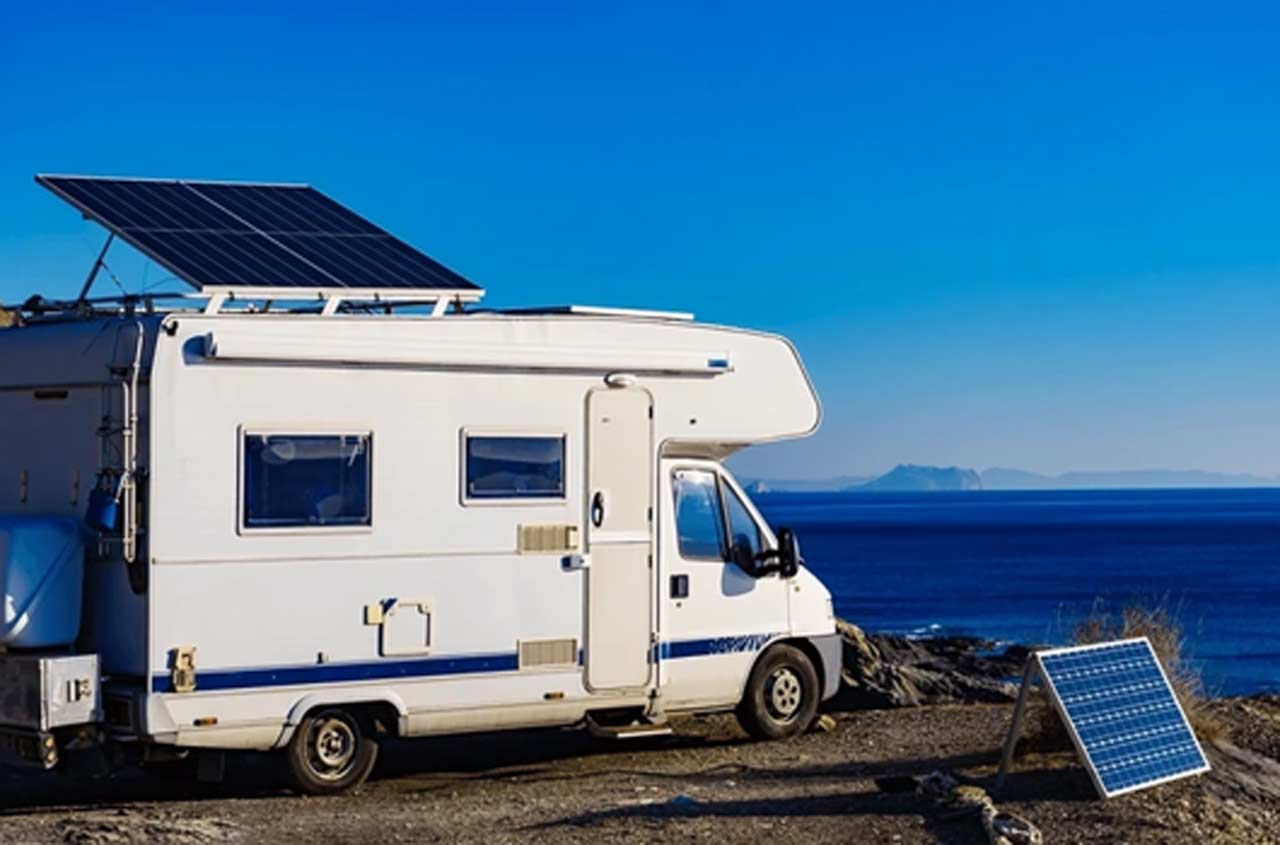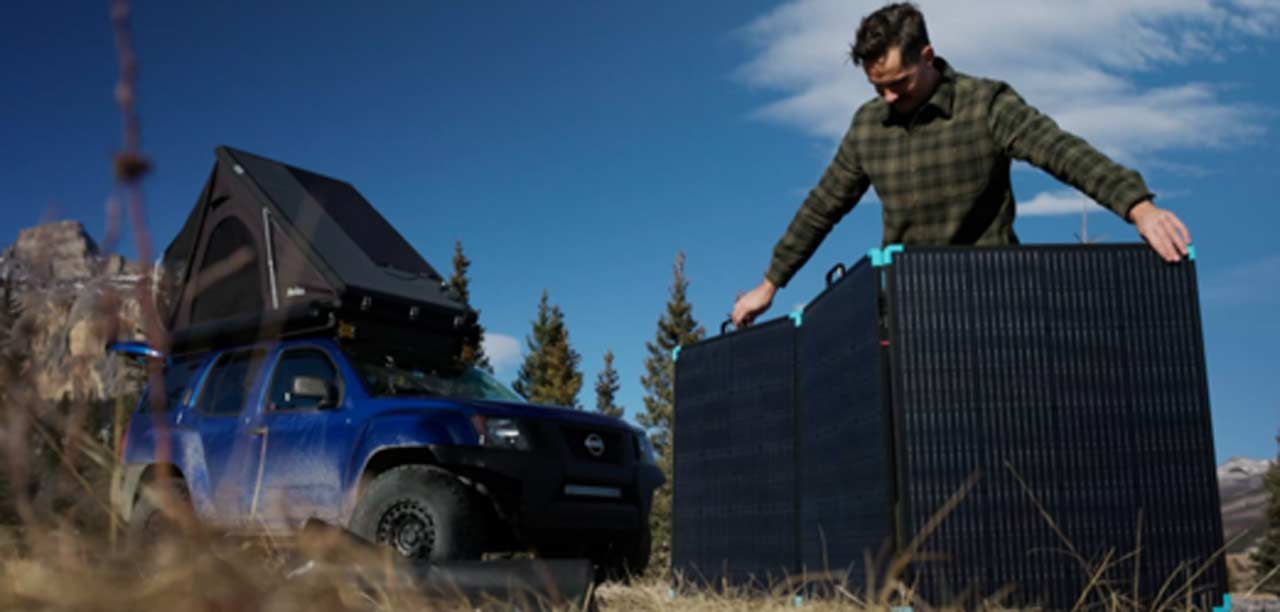
Why Campers Need Solar Panels
As our reliance on electronic devices grows, so does the need for reliable power sources in outdoor settings. Traditional methods of powering devices while camping, such as disposable batteries or gas-powered generators, have significant drawbacks. Batteries quickly run out and contribute to environmental waste, while generators are noisy, emit fumes, and require fuel.
Camping solar panels address these issues by providing a clean, renewable energy source perfect for the outdoor environment. Solar panels for campers allow outdoor enthusiasts to:
- Keep essential communication devices charged for safety
- Power camping gear like lights, fans, and portable fridges
- Reduce their environmental impact
- Enjoy longer trips without worrying about power limitations
- Maintain a connection to work or home when necessary
Types of Solar Panels for Campers
When choosing solar panels for camping, there are three main types to consider:
Portable solar panels for campers
Portable solar panels are designed specifically for camping and outdoor use. They typically feature a folding design that’s easy to pack and transport. These camping solar panels often include built-in stands or grommets for hanging, allowing optimal positioning towards the sun. Portable solar panels for campers are highly mobile and often come with integrated charge controllers. They can be positioned for maximum sun exposure, making them ideal for campers who frequently change locations. However, they may have lower efficiency compared to rigid panels and can be more expensive than other options.
Flexible solar panels for camping
Flexible solar panels are thin, lightweight, and can be bent to conform to curved surfaces. This makes them ideal for mounting on RV roofs, tent tops, or backpacks. The extreme lightweight nature of flexible camping solar panels is a significant advantage, as is their ability to be mounted on irregular surfaces. They’re also less prone to cracking or breaking due to their flexibility. However, flexible panels are generally less efficient than rigid panels and may degrade faster over time due to their flexible nature.
Rigid solar panels for campers
Rigid solar panels are the most common type used in residential and commercial solar installations. While not specifically designed for camping, they can be an excellent option for RV owners or those setting up semi-permanent campsites. Rigid solar panels for campers offer the highest efficiency and power output among the three types. They’re also the most durable and long-lasting, often proving to be the most cost-effective option per watt. The main drawbacks are their weight and lack of portability compared to other options, as well as the need for more careful handling to avoid damage.
Key Factors to Consider When Choosing Solar Panels for Campers
Selecting the right solar panels for your camping needs involves considering several important factors:
Power output of camping solar panels
The power output of a solar panel is measured in watts and determines how much electricity it can produce under ideal conditions. When choosing camping solar panels, consider the power requirements of your devices, how many devices you need to charge, and the amount of sunlight available at your typical camping locations. A good rule of thumb is to choose solar panels for campers with a higher wattage than you think you’ll need, as real-world conditions often reduce efficiency.
Size and weight of solar panels for camping
For campers, especially those backpacking or hiking, the size and weight of the solar panel are crucial considerations. It’s important to balance the need for power with the practicality of carrying the panel. Folding solar panels for campers or flexible options can offer a good compromise between size and power output.
Durability and weather resistance of camping solar panels
Camping often involves exposure to various weather conditions. Look for solar panels for campers that are waterproof or highly water-resistant, able to withstand high winds, constructed with durable materials like strong plastics or tempered glass, and designed to handle temperature fluctuations. These features will ensure your camping solar panels can withstand the rigors of outdoor use.
Compatibility of solar panels with camping devices
Ensure that the solar panels you choose can charge your specific camping devices. Consider the types of ports available (USB, 12V, etc.), whether the panel includes a charge controller, and compatibility with power banks or batteries for energy storage. This will ensure that your solar panels for camping can effectively power all the devices you plan to use while outdoors.
Choosing the best solar panels for your camper requires considering your energy requirements, available space, budget, and desired efficiency. Renogy is a popular choice among campers since it is dependable and of good quality. Renogy’s line of sturdy, efficient, and reasonably priced solar panels includes the highly acclaimed Renogy 400W Lightweight Portable Solar Suitcase. This folding system is simple to set up and carry, making it ideal for anyone with diverse and powerful energy requirements. With Renogy, you can be sure in the dependability and endurance of your solar power system, guaranteeing a hassle-free and joyful camping experience.
Setting Up and Using Solar Panels for Campers
Proper setup and use of your camping solar panels can significantly impact their effectiveness:
Positioning camping solar panels for optimal sunlight
To maximize energy production from your solar panels for campers:
- Face the panel directly towards the sun
- Adjust the angle throughout the day if possible
- Avoid shade from trees, buildings, or other obstructions
- Consider using a solar tracker for more advanced setups
Connecting devices to camping solar panels
Most portable solar panels for campers come with built-in charge controllers and various connection options. To use your panel:
- Unfold or position the camping solar panel in direct sunlight
- Connect your devices directly to the panel’s output ports
- For more consistent power, connect the panel to a portable battery or power station
Tips for maximizing efficiency of solar panels for campers
- Clean the camping solar panel regularly to remove dust and debris
- Use energy-efficient devices to reduce power consumption
- Charge devices during peak sunlight hours
- Consider a larger battery bank for storing excess energy
- Use energy-saving modes on your devices when possible
RV Solar Panel Maintenance Tips for Campers
For RV owners using solar panels, proper maintenance is key to longevity and efficiency:
- Regular cleaning: Gently clean camping solar panels with water and a soft cloth to remove dirt and grime.
- Check connections: Ensure all wiring connections are tight and free from corrosion.
- Monitor battery health: Regularly check the condition of your RV’s batteries, as they’re crucial to the solar system.
- Inspect for damage: Look for any cracks, chips, or other damage to the panels or mounting hardware.
- Keep panels unobstructed: Trim any overhanging branches or relocate your RV if shadows are blocking the solar panels.
- Seasonal adjustments: Change the angle of your camping solar panels with the seasons to optimize sun exposure.
- Professional check-ups: Consider having your solar system for camping inspected by a professional annually.
Conclusion
Solar panels for campers have become an invaluable tool for modern outdoor enthusiasts, offering a sustainable and practical solution to power needs in the great outdoors. By carefully considering the type of camping solar panel, key features, and proper usage techniques, campers can significantly enhance their outdoor experience while minimizing their environmental impact.
As technology continues to advance, we can expect solar solutions for campers to become even more efficient, lightweight, and integrated into outdoor gear. Whether you’re a weekend warrior or a long-term adventurer, incorporating solar panels into your camping setup is a step towards a more sustainable and enjoyable outdoor experience. Embrace the power of the sun and elevate your camping adventures with solar panels designed for campers!








